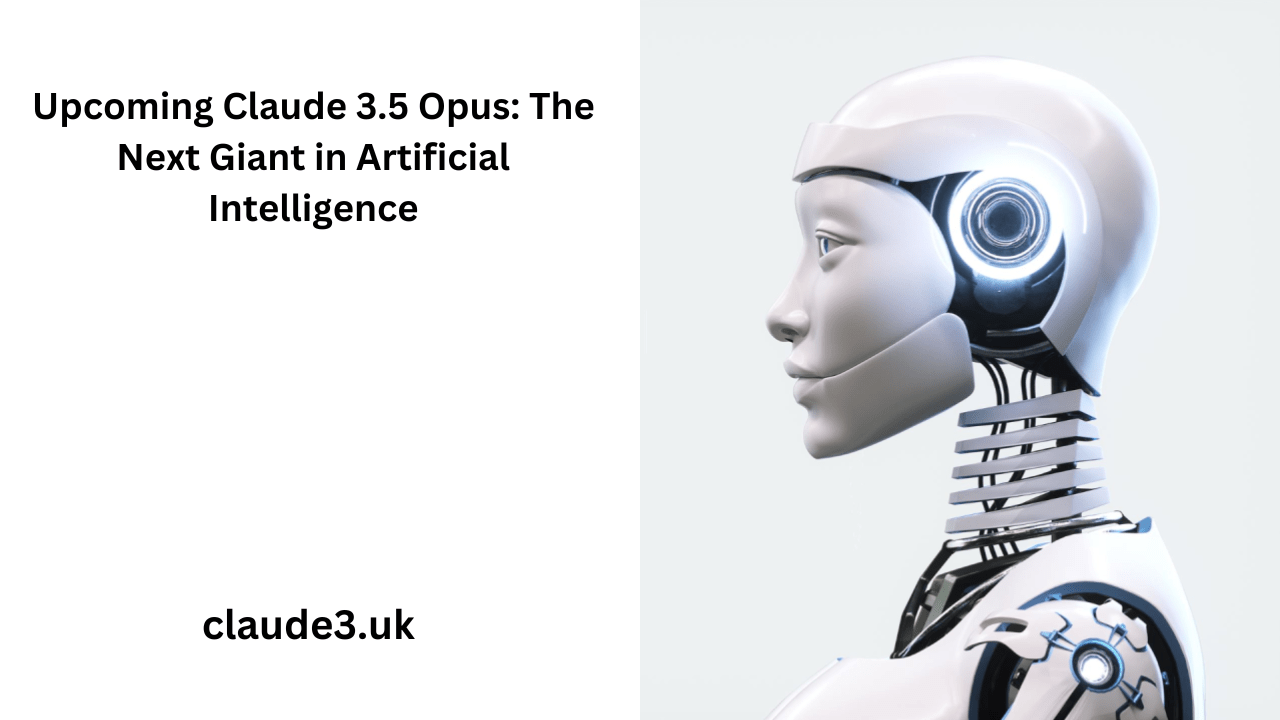The realm of artificial intelligence (AI) is in constant flux, with new advancements pushing the boundaries of what machines can achieve. Among the anticipated milestones in AI development is the release of Claude 3.5 Opus by Anthropic.
This forthcoming iteration promises to revolutionize the AI landscape, building on the strengths of its predecessors while introducing groundbreaking features.
This article delves into the various facets of Claude 3.5 Opus, exploring its expected capabilities, development process, potential applications, and the broader implications for the future of AI.
The Evolution of the Claude Series
Origins and Development
The Claude series has been a pivotal force in the AI community, known for its sophisticated language models that excel in understanding and generating human-like text. Named in honor of Claude Shannon, the father of information theory, each version has brought significant advancements.
- Claude 1.0: The inaugural model focused on basic language processing and generation, laying the foundation for more complex capabilities.
- Claude 2.0: Enhanced with improved contextual understanding and the ability to handle more complex queries, making it a versatile tool for various applications.
- Claude 3.0: Marked a leap in coherence and contextually appropriate responses, setting new standards in natural language processing.
- Claude 3.5: Introduced advanced safety mechanisms and greater versatility, addressing ethical concerns and expanding its application range.
What Sets Claude 3.5 Opus Apart?
Claude 3.5 Opus is poised to be a transformative release, bringing together the best features of its predecessors with significant upgrades. The “Opus” designation suggests a masterpiece, indicating comprehensive enhancements across multiple dimensions of AI functionality.
Expected Features of Claude 3.5 Opus
Superior Language Comprehension
3.5 Opus is expected to showcase remarkable improvements in understanding and generating nuanced, contextually rich language. This includes better handling of idiomatic expressions, cultural references, and complex syntactical structures.
Robust Safety Mechanisms
Safety and ethical considerations are at the forefront of AI development. Claude 3.5 Opus is anticipated to feature state-of-the-art safety protocols designed to prevent misuse, such as the generation of harmful or biased content, while promoting responsible and ethical use.
Enhanced Versatility
Building on the versatility of Claude 3.5, the Opus version is expected to excel across a wider array of applications. From creative writing and academic research to customer service and technical support, Claude 3.5 Opus aims to be a multifaceted tool capable of addressing diverse needs.
Seamless Integration
In an increasingly interconnected digital ecosystem, integration capabilities are crucial. Claude 3.5 Opus is expected to offer seamless compatibility with various software platforms, APIs, and other AI systems, facilitating its incorporation into a broad range of applications.
The Development Process
Research and Innovation
Developing a model as advanced as Claude 3.5 Opus involves extensive research and innovation. This includes refining machine learning algorithms, exploring new neural network architectures, and leveraging the latest advancements in AI research to enhance the model’s capabilities.
Data Collection and Processing
High-quality, diverse data is essential for training effective AI models. The development of Claude 3.5 Opus likely involves vast datasets encompassing a wide range of languages, contexts, and domains. This process includes rigorous data cleaning, preprocessing, and augmentation to ensure the model can handle varied inputs with high accuracy.
Training and Fine-Tuning
Training an AI model of Claude 3.5 Opus’s caliber requires substantial computational resources and expertise. The training process involves iterative cycles of learning, validation, and fine-tuning to optimize performance. This ensures the model not only learns from the data but also generalizes well to new, unseen inputs.
Addressing Ethical and Safety Concerns
Ensuring the ethical use of AI is a critical aspect of the development process. The team behind 3.5 Opus must address potential issues related to bias, misinformation, and misuse. This includes implementing safety features that prevent the model from generating harmful content and adhering to ethical standards and regulatory requirements.
Potential Applications
Creative Writing and Content Generation
Claude 3.5 Opus is expected to excel in creative writing, assisting authors, poets, and content creators in generating high-quality text. Its enhanced language comprehension and contextual awareness will enable it to produce compelling narratives, poems, and other creative works.
Academic and Scientific Research
In the realm of academia and science, Claude 3.5 Opus can serve as a valuable tool for generating research papers, summarizing scientific literature, and even aiding in data analysis. Its advanced capabilities will facilitate the production of accurate, coherent, and insightful academic content.
Customer Service and Technical Support
Businesses can leverage Claude 3.5 Opus to enhance customer service and technical support. The model’s ability to understand and respond to complex queries will enable it to provide accurate and helpful assistance, improving customer satisfaction and operational efficiency.
Healthcare and Medical Applications
In healthcare, Claude 3.5 Opus can assist with tasks such as patient communication, medical record summarization, and even preliminary diagnosis support. Its advanced language capabilities can help bridge communication gaps between patients and healthcare providers, enhancing the quality of care.
Education and Learning
Educational institutions can benefit from Claude 3.5 Opus by using it to develop personalized learning materials, provide tutoring assistance, and generate educational content. Its ability to understand and explain complex concepts makes it a valuable resource for both students and educators.

Implications for the AI Industry
Advancements in AI Technology
The release of Claude 3.5 Opus is expected to drive significant advancements in AI technology. Its enhanced capabilities will set new benchmarks for language models, spurring further innovation and development in the field.
Competitive Landscape
Claude 3.5 Opus will likely intensify competition among AI developers. Competing models from companies like OpenAI, Google, and Microsoft will face a formidable challenge, prompting them to innovate and improve their own offerings.
Ethical and Regulatory Considerations
The advanced capabilities of Claude 3.5 Opus will also bring ethical and regulatory considerations to the forefront. Ensuring the responsible use of such powerful AI models will be crucial, necessitating updated regulatory frameworks and ongoing dialogue about AI ethics.
Market Impact
The release of Claude 3.5 Opus will have a substantial impact on the market, influencing various industries and applications. From enhancing business operations to revolutionizing content creation, its versatile capabilities will drive widespread adoption and innovation.
Preparing for the Release
For Developers
- Understanding New Capabilities: Developers should familiarize themselves with the new features and improvements in Claude 3.5 Opus to fully leverage its potential.
- Integration Planning: Planning for seamless integration into existing systems and applications to enhance functionality and performance.
- Ethical Considerations: Ensuring that the use of Claude 3.5 Opus aligns with ethical guidelines and does not contribute to misuse or harm.
For Businesses
- Evaluating Impact: Assessing how Claude 3.5 Opus can be utilized to improve operations, customer service, and product offerings.
- Training and Adoption: Preparing teams for the adoption of the new model, including training on its capabilities and best practices.
- Monitoring and Compliance: Establishing monitoring mechanisms to ensure compliance with ethical standards and regulatory requirements.
For Researchers
- Exploring New Research Opportunities: Leveraging Claude 3.5 Opus for advancing research in various fields, from linguistics to artificial intelligence.
- Collaborative Projects: Engaging in collaborative projects to explore the model’s capabilities and address potential challenges.
- Contributing to Ethical AI: Participating in discussions and initiatives aimed at promoting the ethical use of AI and mitigating risks.
Conclusion
Claude 3.5 Opus represents a significant milestone in the evolution of artificial intelligence. With its superior language comprehension, robust safety mechanisms, and enhanced versatility, it is poised to become a game-changer in the AI industry.
As we anticipate its release, the focus should be on understanding its capabilities, preparing for its integration, and ensuring its ethical use. The impact of Claude 3.5 Opus will be felt across various sectors, driving innovation, improving operations, and shaping the future of AI.
FAQs
How does Claude 3.5 Opus differ from previous versions?
Claude 3.5 Opus builds on the strengths of its predecessors with improved contextual awareness, better handling of complex queries, and more advanced safety features to prevent misuse and ensure ethical use.
When will Claude 3.5 Opus be released?
There is no official release date for Claude 3.5 Opus as of now. The release date will likely be announced by Anthropic through their official channels.
How will Claude 3.5 Opus impact the AI industry?
Claude 3.5 Opus is expected to drive significant advancements in AI technology, intensify competition among AI developers, and influence ethical and regulatory discussions surrounding the responsible use of AI.
What opportunities does Claude 3.5 Opus present for researchers?
Researchers can use Claude 3.5 Opus to advance studies in various fields, engage in collaborative projects, and contribute to ethical AI initiatives. Its capabilities can significantly enhance research quality and scope.
What are the ethical considerations associated with Claude 3.5 Opus?
Ethical considerations include preventing misuse, addressing biases, ensuring the responsible use of AI, and adhering to regulatory requirements to mitigate risks associated with powerful AI models.
